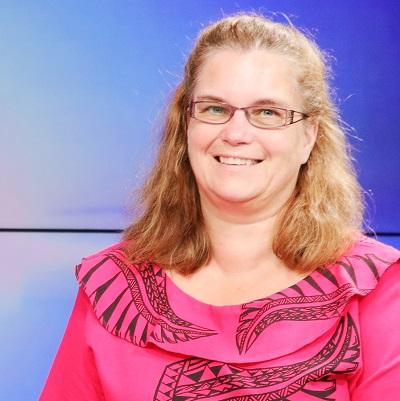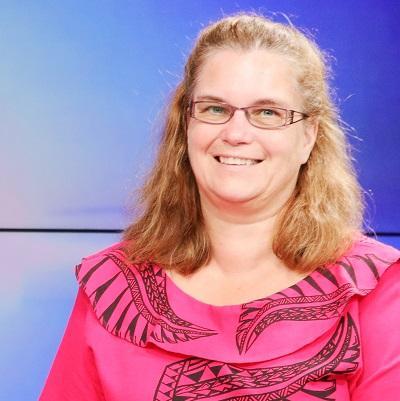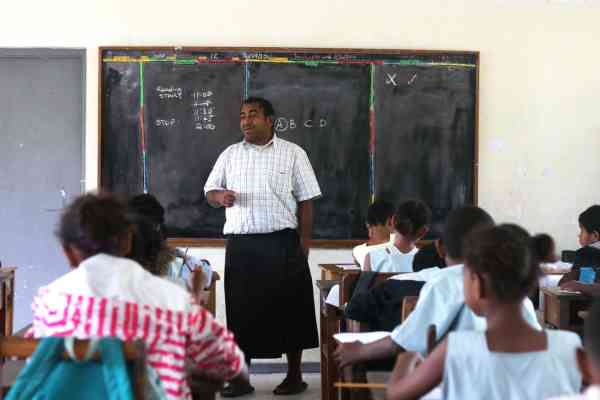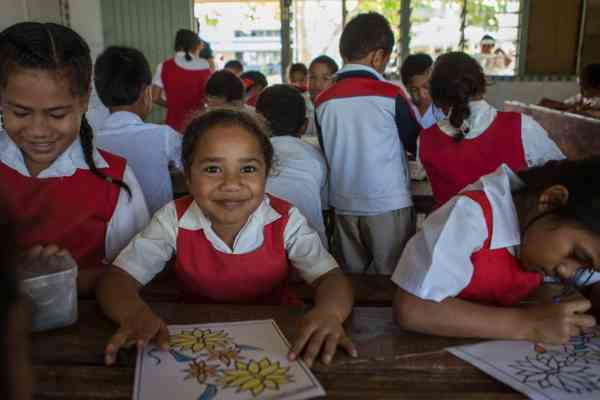Remarks by SPC’s Educational Quality and Assessment Programme Director Dr Michelle Belisle
At the Pacific Regional Education Framework MEL Reflection Workshop
 Good morning, and a warm welcome on behalf of the Pacific Community’s Educational Quality and Assessment Programme to everyone joining us today either in person or online. We come together this week in support of Monitoring, Evaluation and Learning for the Pacific Regional Education Framework, a gathering that has been in planning for several months now and has been on the horizon for several years.
Good morning, and a warm welcome on behalf of the Pacific Community’s Educational Quality and Assessment Programme to everyone joining us today either in person or online. We come together this week in support of Monitoring, Evaluation and Learning for the Pacific Regional Education Framework, a gathering that has been in planning for several months now and has been on the horizon for several years.
This reflection workshop is all about sharing learning, something that member countries, implementing agencies, development partners and regional stakeholders committed to at the time of the PacREF design. Before we can learn from our experiences and use that knowledge to make improvements for future efforts, we have to reflect on what worked well, what maybe didn’t go as well as hoped and try to identify what led to those particular successes and challenges. That is what these three days are all about.
We have all been part of a variety of efforts over the past year in which we have been asked about the PacREF: about the implementation of activities, about progress and about how well PacREF is being communicated across the education sector in the region. So how is what we are doing this week different from the Joint Oversight Mission, the midterm review, or the six-monthly updates on the status of activities? The difference is in the sharing of learning. This is the first time that we have representation from the implementing agencies, the PacREF Facilitation Unit and the member countries all together to hear one another’s perspectives and experiences. This is an opportunity to truly listen to what kinds of issues have arisen and also to hear about what has gone well from these multiple perspectives. By coming together, we have a chance to not only hear but to ask questions and to try to understand the “why” behind the “what”.
With the completion of 1 year and 4 months of implementation (July 2021 – October 2022) we want to draw on important observable changes noted in terms of progress of the 65 activities under the Implementation Rolling Plan. In the first sessions today, we will all be updated on the overall status of those activities as they relate to the 15 regional public goods that are to be delivered through the PacREF. As we progress through the sessions over the course of our three days together, we will work together at picking up qualitative information about those changes and begin to articulate lessons learnt along the way. It is the coming together to collectively learn from our experiences that will help us all to strengthen the PacREF and move closer to achieving the ambitious set of outcomes that were endorsed by the ministers.
But before we get started, let’s unpack this a bit. The PacREF is a major undertaking and is ground-breaking in many ways. As a truly regional collaborative effort, the PacREF brings together 15 countries and half a dozen implementing agencies as well as regional and international organisations to work collectively to achieve a set of substantive outcomes across four policy themes. While having the backing of the governments of the countries involved, participation is voluntary across the member states and aligned to priorities identified and refined by heads of education systems over a 24-month period. As a result, the PacREF is a complex system of integrated work and relationships that requires commitment and effort to maintain – just as is the case with any relationship. And as is the case in relationships of all types, communication and dialogue, honesty, respect, and a willingness to give and take are all part of working to keep the relationship healthy and evolving.
Over the next three days, we will all be asked to participate in actively nurturing and growing the dynamic relationship we have built together. In this instance, more than any other time I can think of in my experience over the years, the whole is truly greater than the sum of its parts. We don’t have 65 individual projects that work in isolation; we have an organic, growing, changing and exciting entity that comprises those 65 activities but also fosters working together towards a stronger, more sustainable future in education across the entire region.
As you look through the programme for this workshop, you will see multiple opportunities for sharing. There will be information provided by the PFU and EQAP from the monitoring side as well as sharing of stories from each of the members and implementing agencies to highlight the ups and the downs experienced in the first stages of PacREF implementation. I challenge all of us to listen, really listen, to what each presenter is saying. Everyone, no matter what their role in the implementation of the PacREF, has a story to tell and each of those stories needs to be heard to understand the what, the why and the how of both successes and failures along the way.
But sharing honestly and listening with an open mind is only half of the equation. What are we going to DO with what we hear? How are we going to act, collectively and individually, on the information we glean from the stories and the sharing? I said earlier that the PacREF is ground-breaking in many ways, and this is another. Coming together like this, to dissect what has been done and why it did or did not turn out as expected, is generally undertaken at the end of a project when nothing more can be done to change the outcome. The hope is always to use what has been learned for future projects but then the project team disperses and save for a nicely formatted report stored away in file cabinets or on hard drives, the process ends there.
Not so in the case of the PacREF. By design, we are actively seeking to learn and adjust as we go, taking what the quantitative and qualitative data tell us and working together to make sense of that information to inform our next steps and the steps on down the line. This “project team” isn’t going anywhere because the implementing agencies, members, development partners and stakeholders are here. Period. As partners in the implementation of the PacREF it belongs to the region. The lessons that we learn along the way are part of the maturing of the relationship we have all committed to. We get to know one another, our ins and outs, our unique characteristics as organisations and systems and we use that knowledge to refine how we work together to be more successful and more sustainable.
I look forward to the next three days of sharing and discussion and am excited to hear about how things are going from all aspects of the PacREF. I hope that we will all find that in hearing the stories, we will get a sense of what has already been accomplished (and it is significant) and what is coming up in the next several months. That will be the easy part. The more challenging, yet definitely more important task for all of us is to take what we learn here this week and use that information to actively change our behaviour and approaches to make this relationship and the PacREF stronger, healthier and even more fit for purpose to achieve the overarching goal of raising the quality of education across the Pacific, to enhance learners’ education outcomes, and to produce high quality graduates who are able to contribute economically and socially to their communities.
So, let’s all put away our cell phones, close our email and messaging apps and really engage with one another to make the most of this opportunity to learn and grow together. Wishing all of us a successful and rewarding workshop experience.
Thank you.


